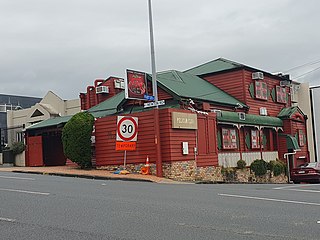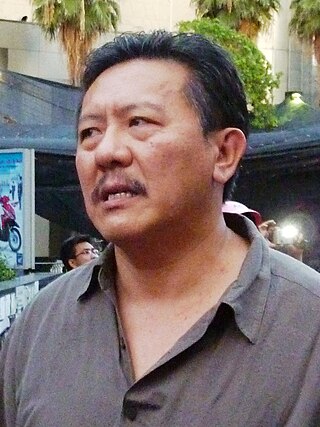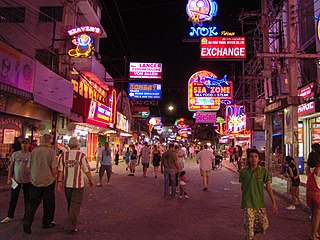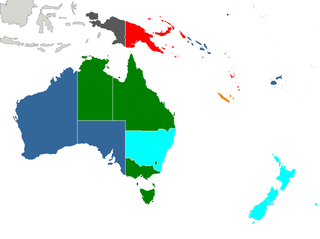
Erotic massage is the use of massage techniques by one person on another person's erogenous zones for their sexual pleasure. The process may achieve or enhance the recipient's sexual excitation or arousal and sometimes achieve orgasm. The person providing the massage is called a masseur (male) or masseuse (female). Massages have been used for medical purposes for a very long time, and their use for erotic purposes also has a long history. In the case of women, the two focal areas are the breasts and pubis, while in case of men, the focal area is the male genitals, the anus, and the prostate. When the massage is of a partner's genitals, the act is usually referred to as a handjob for penises and fingering for vulvas.

Prostitution in New Zealand, brothel-keeping, living off the proceeds of someone else's prostitution, and street solicitation are legal in New Zealand and have been since the Prostitution Reform Act 2003 came into effect. Coercion of sex workers is illegal. The 2003 decriminalisation of brothels, escort agencies and soliciting, and the substitution of a minimal regulatory model, created worldwide interest; New Zealand prostitution laws are now some of the most liberal in the world.
An escort agency is a company that provides escorts for clients, usually for sexual services. The agency typically arranges a meeting between one of its escorts and the client at the customer's house or hotel room (outcall), or at the escort's residence (incall). Some agencies also provide escorts for longer durations, who may stay with the client or travel along on a holiday or business trip. While the escort agency is paid a fee for this booking and dispatch service, the customer must negotiate any additional fees or arrangements directly with the escort for any other services that are not provided by the agency involved, such as providing sexual services.

Chuwit Kamolvisit is a controversial Thai politician who was once the country's biggest massage parlour owner, known as the "tub tycoon". After an arrest in 2003, he publicly claimed that he paid large bribes to many Thai police officers. He then sold some of his massage parlors, formed his own political party and unsuccessfully ran for Bangkok governor in August 2004. In 2005 he was elected for a four-year term to the Thai House of Representatives, but in 2006 the Constitutional Court removed him from parliament. In October 2008 he again ran for governor of Bangkok as an independent but was not elected. In the July 2011 general election his party won four seats in the House of Representatives. He used the pseudonym Davis Kamol on occasion.

A massage parlor, or massage parlour, is a place where massage services are provided. Some massage parlors are front organizations for prostitution and the term "massage parlor" has also become a euphemism for a brothel.

Prostitution in Thailand is illegal. However, due to police corruption and an economic reliance on prostitution dating back to the Vietnam War, it remains a significant presence in the country. It results from poverty, low levels of education and a lack of employment in rural areas. Prostitutes mostly come from the northeastern (Isan) region of Thailand, from ethnic minorities or from neighbouring countries, especially Cambodia, Myanmar, and Laos. UNAIDS in 2019 estimated the total population of sex workers in Thailand to be 43,000.

In Great Britain, the act of engaging in sex as part of an exchange of various sexual services for money is legal, but a number of related activities, including soliciting in a public place, kerb crawling, owning or managing a brothel, pimping and pandering, are illegal. In Northern Ireland, which previously had similar laws, paying for sex became illegal from 1 June 2015.
George McCoy is a British writer best known for producing McCoy's British Massage Parlour Guide, a series of guidebooks to establishments and women in Britain that provide sexual services. The books do not include businesses that provide therapeutic massage services. The term massage parlour is used in the title of the books because the term massage is commonly used in Britain to euphemistically advertise sex work, soliciting prostitution being illegal in the country. McCoy has also written several other guides to sexual services in Britain and appeared in the media to discuss the country's sex industry.
Prostitution in Ireland is legal. However, since March 2017, it has been an offence to buy sex. Third party involvement is also illegal. Since the law that criminalises clients came into being, with the purpose of reducing the demand for prostitution, the number of prosecutions for the purchase of sex increased from 10 to 92 between 2018 and 2020. In a report from UCD's Sexual Exploitation Research Programme the development is called ”a promising start in interrupting the demand for prostitution.”
Prostitution in Myanmar is illegal, but widespread. Prostitution is a major social issue that particularly affects women and children. UNAIDS estimate there to be 66,000 prostitutes in the country.

Prostitution or sex work in Australia is governed by state and territory laws, which vary considerably. Federal legislation also affects some aspects of sex work throughout Australia, and of Australian citizens abroad.
Prostitution in Jamaica is illegal but widely tolerated, especially in tourist areas. UNAIDS estimate there to be 18,696 prostitutes in the country.

The Prostitution Reform Act 2003 is an Act of Parliament that decriminalised prostitution in New Zealand. The Act also gave new rights to sex workers. It has attracted international attention, although its reception has been mixed. The Act repealed the Massage Parlours Act 1978 and the associated regulations.
Prostitution in Malaysia is restricted in all states despite it being widespread in the country. Related activities such as soliciting and brothels are illegal. In the two states of Terengganu and Kelantan, Muslims convicted of prostitution may be punishable with public caning.
Prostitution in Scotland has been similar to that in England under the State of Union, but since devolution, the new Scottish Parliament has pursued its own policies.
Prostitution in Mongolia is illegal but widespread in some areas. The Global Fund for Tuberculosis, HIV/AIDS and Malaria estimated there were about 19,000 sex workers in the country in 2006. Many women in Mongolia turn to prostitution through poverty.

Dame Catherine Alice Healy is a New Zealand sex workers' rights activist, field researcher and former prostitute working for decriminalisation of prostitution and generally for the improvement of the sex work profession. She is the national coordinator and a founding member of the New Zealand Prostitutes' Collective (NZPC).

Prostitution in Oceania varies greatly across the region. In American Samoa, for instance, prostitution is illegal, whereas in New Zealand most aspects of the trade are decriminalised.
Prostitution in Guam is illegal but is practised covertly, especially in massage parlours. Although massage parlours are sometimes raided, generally the authorities turn a blind eye.
Chinese prostitution in Paris has developed since the late 1990s. Prostitutes of Chinese origin work mainly on the streets of some neighbourhoods, where they are nicknamed les marcheuses, but also in massage parlours or through the internet. In 2016, Médecins du Monde estimated that there were 1,450 Chinese prostitutes in Paris.










